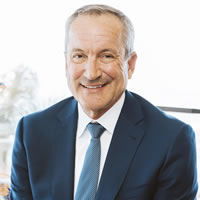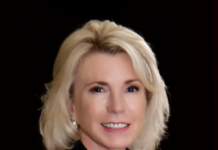Paul Boynton Podcast Transcript
Paul Boynton joins host Brian Thomas on The Digital Executive Podcast.
Welcome to Cort Technologies, home of the Digital Executive podcast.
Brian Thomas: Welcome to the Digital Executive. Today’s guest is Paul Boynton. Paul Boynton is co-founder and Chief Operating Officer of Company Search Incorporated, Aka CSI, A next generation platform for business intelligence and business analytics. Paul’s expertise as a developer, implementer and provider of information emerged from decades of utilizing data-driven decisions, servicing industry leaders, multinationals, and subject matter experts in the corporate insured space.
Driving programs for operational and risk management results are career hallmarks, facilitating emerging market sustainability and growth for the likes of Dell, McDonald’s, Walmart, and leaders in the commodities and chemicals industries. A testament to a career that secures risk sharing partnerships to facilitate large capital investments.
Paul has worked on all sides of the insurance matrix, learning the trade as an underwriter and analyst with FCIA, negotiating reinsurance treaties with Willis Faber and retail corporate relationships with Johnson and Higgins.
Well, good afternoon, Paul. Welcome to the show.
Paul Boynton: Hey. Thanks Brian. It’s great to see you again. I really appreciate you having me back.
Brian Thomas: Absolutely, my friend. I appreciate it. And you’re still in Dallas? I’m still in Kansas City. And we probably talk about barbecue rivalry or football, but uh, let’s get into something more exciting, the stuff that you’re doing right now.
If I could, I’m gonna jump into your first question. Your career path spans underwriting at FCIA, negotiating reinsurance at Willis Faber and direct client relationships at Johnson and Higgins. Culminating in the creation of CSI. Could you walk us through how these experiences shaped your vision for building a next generation business intelligence platform?
Paul Boynton: So, you know, my first job outta college was with the FCI Management company, which is a export credit insurance company, and that’s really where it started for me. And I got involved with international business. But you know, I was a green visor underwriter, right? So as my first look at, you know, operations, financials of foreign companies, and I did that for a few years and, you know, understood that process and, and I, I jumped over into the reinsurance side of the business, which is a, a step removed reinsurers, you know, insure insurance companies, right?
So reinsurance treaties are the back line of insurance risk takers. And yeah, so my background in the trade credit insurance business played a big role in, in our team that was placing reinsurance treaties for various underwriters of export credit and political risk insurance. So, did that for a few years and then, uh, this is all in New York.
Ended up working at Johnson and Higgins, which. Has become Marsh McLennan, uh, quite a while ago, but you know, this is now the, the late nineties and I was part of a national resource team in the trade political risk insurance area. So, you know, kind of think of it like in those days we were sort of like a modern day platform instead of.
Clicking on the CSI platform that you do, 2 0 2 5. In those days, you would pick up the phone and, and call actual people to come in and provide expertise on lanes of business that they didn’t have the expertise to do. So we would come in and help them, uh, get their clients taken care of and, and what we did.
And ultimately I did work for Fortune 100 companies, believe my gig was to help our clients. Do more business, do more trade, do boots on the ground operations in those countries with the support of insurance capital. By going through those experiences, the insurance companies didn’t wanna get involved with it.
And the, you know, sort of surface level of due diligence you do on counterparties doesn’t really cut it when you’re talking about these different Latin America, Asian countries. So we would’ve to go the extra mile. And bring these capital providers onsite to see these counterparties, learn all about ’em, do a deep dive behind the curtain, look at the owners, at the operations, at the business cycle, all that stuff.
So we could, you know, develop the trust you needed to get a deal done and get a new partner. And that’s really the passion of that next level due diligence. That is the behind what we’re trying to do here with this PSI platform. Provide that level of due diligence, but you don’t have to get on a plane and you don’t have to get information yourself that we can provide for you.
Brian Thomas: Thank you. I appreciate that. That backstory there, you’ve got, uh, just a plethora of experience in this space, insurance, InsureTech, et cetera. I like the fact that you, you know, right outta college you were an underwriter, right? And you moved into reinsurance and then you have national, international experience.
A lot of work in the extensively in the due diligence space. So I really appreciate that. I know all that contributes to what you do today with your CSI platform. Paul, you mentioned that strategic insights often stem from local partners and human relationships. How do personal connections and on the ground knowledge complement CSI’s, data-driven analytics?
Paul Boynton: We do a lot of of the data points of due diligence, right? So background, operations, ownership, performance. Media. We have a JV with Dow Jones. So we have the media, uh, and what’s going on in the public space with whatever counterpart you’re working for. Credit opinions. We do credit ratings that we provide in countries that the Moody’s and the s and ps don’t provide, but they actually acknowledge our credit opinions and ratings and use them.
And you know, we do industry and market analytics, so we can’t really, we’re not replacing a person. We’re trying to provide gaps of info that maybe we’re gonna have that you can’t get elsewhere. But the insight that if you’re not looking at, maybe you should be looking at as you ascertain and analyze risk.
So we’re not gonna be that person that takes you around the factory or takes you around a customer, but what we wanna be is. A tool that can help you get far enough that maybe you can get it done with a couple of Zoom calls with, you know, your local partners and you don’t have to jump on that plane or, you know, we have enough information that gives you enough insight that you trust that you’re making the right decision.
Brian Thomas: Thank you. I appreciate that. Absolutely. And there’s just so much data these days to glean through when you’re doing due diligence as an example. But you know, humans can make mistakes and machines can too, but machines are less likely to, if they follow, they are. Proper programming and algorithms, et cetera.
But I like how you are leveraging business intelligence and those insights to fill the gaps to help again, that partnership, as you would say. I really appreciate that, Paul. You’ve stated that AI is only as powerful as the data behind it, and CSI emphasizes a strong data quality index. How do you maintain data integrity while scaling AI driven features and what’s next for CSI’s AI roadmap?
Paul Boynton: Thanks for prompting that one, because that’s an exciting thing about us. So, you know, we, we look at that term AI a little different because we’ve been in the machine learning business for almost 10 years now. So we’ve been hearing AI for a long time and we kind of look at that phrase and go, eh, you know, it’s super overused and all that.
Right? But yeah, it is different. It’s totally different now than when we were doing machine learning models 10 years ago, and we have a large language model. Module on our site now is called zaba, and ZABA is our AI mode that is extracting info just from our data pool, right? So when you go on GR or GPT or something, it’s extracting data from the whole internet except our data pool.
So if you ask, you know about. Textile mills in Turkey that, you know, make genes like Levi Strauss, and they’ve been around 10 years and they’re profitable and stuff like that. It’s not really gonna have info on the different textile mills in Turkey. It’ll give you different websites to look at and research.
Whereas our database and Zaba has every textile mill and Turkey in our database. It will come back to, say. On your criteria. These are some things you need to be thinking about. And these are five good ones that you may wanna be doing business with. And so we’ll give our subscriber everything, financials, performance, contact info, the whole gig.
So it’s very cool, very insightful tool that we’re excited about. It’s new, it’s gonna improve, but for now, the results have been very encouraging. And these are things that are, they’re difficult to manage. ’cause you know, we’re a little company. You know, we’re gonna need to get some more investment and all that stuff.
We’re always doing that balance between getting good domain expertise with skilled data scientists so we can scale in a way that, you know, anomaly detection and analytics scales along with our data. We have many terabytes of data, so it’s always a challenge, but we’re gonna firmly be in that AI space in the business intelligence world.
Brian Thomas: Thank you. I appreciate that. The last time we talked about this, you did talk about the work you’ve been doing in machine learning the past 10 years, but so much has changed as you highlighted. And your LLM behind your platform. Zaba is really powerful around providing sound financial data behind the research that you’re doing.
But you did mention you’re still going through some growing pains, which is a good thing, right? It’s a good problem to have. You’re figuring out your way and how to improve and having to add some data scientists, et cetera, to really make your platform even more robust. So I appreciate the insights there, Paul, the last question I have for you today, there are many real world examples of hidden ownership links that could trigger regulatory violations under the new rule called BIS 50%.
How is CSI’s proprietary data and entity mapping tools help compliance teams get ahead of regulatory complexity?
Paul Boynton: Thanks for, uh, for asking that one, because that, that is a, it’s a new rule that’s been implemented by the new administration and it’s a very important rule and, and it’s something that really emphasizes the need to do that next level of due diligence, particularly in ownership penetration.
So the common example is Vietnamese companies that are ultimately owned by Chinese companies or Chinese individuals. So ultimately, if that ownership is over 50%, the Vietnamese company will be subject to Chinese terrorists. So you have to do the due diligence to not only understand who owns your supplier, but who owns the owner and who their subsidiaries are, who their affiliates are, and who owns those companies.
And that is, uh, an area of, uh, pay that we are probably the industry leader in that ownership penetration research. And along with that, we’re very strong in import export trade information. So when you’re looking at information that’s provided by customs houses, we obviously have for, I think it’s 33 countries now, but we also have trade information on countries that don’t provide customs info because we have so many data points.
So every company in China that does business in the us, we know who they’re selling to and we know who they’re buying from. So we’ll have that info from their customs agency. So those are areas where our site, that’s just one or two little examples of the data on our site that is easy to use and provides a lot of value.
Brian Thomas: Thank you. I appreciate that. And I didn’t know that you had that much knowledge and depth and experience in ownership, penetration research, trade information, international obviously, but this new BIS 50% rule is important. It does help highlight, you know, those companies that are maybe owned by another entity.
And your example here was a, a Vietnamese company that had maybe more than 50%. Ownership by China, that’s obviously going to change how the tariffs work. And with your research, your platform, you’re able to provide that level of information more quickly and more accurately. So I appreciate that. And Paul, it was such a pleasure having you on today, and I look forward to speaking with you real soon.
Paul Boynton: I appreciate it, Brian.
Brian Thomas: Bye for now.
Paul Boynton Podcast Transcript. Listen to the audio on the guest’s Podcast Page.











